QuestionHi, my name is mark and in january i bought two baby beardies. one at a pet store and one at an herp show. now the one i bought at a pet store is perfectly fine other than having one eye, (im guessing it was poked out before i got it) now the one i got from the breeder is not eating and hasnt ate for about 5 days now. i put veggies in about 3 times weekly. (ie shredded greens and carrots) i also feed them medium sized crickets becasue their jueveniles now. like i said the pet store one is eating both fine, but the breeder beardie turns his head to everything. i have a 20 gallon long tank for them now, and use a 100 uav bulb during the day, and a 60 watt ceramic clay emmiter at night. the basking spot in the tank reaches about 95 - 100 degrees and the cool spot is about 85 degrees. i have two stick on thermometers to monitor the temps. i just switched out their bedding from sand to grounded walnut shells, because i read its a good heat conductor. now it might be the change of subsrate however he was eating after the substrate change. i spray both of my beardies daily and see both of them drink for their dish freguently. i'm new to beardies as these are my first. so any helpful tips or any knowledge you could pass on would be appriciated. thank you.
AnswerI'm a bit perplexed. Do you not know whether your Beardie was missing an eye at the time you purchased it?? You didn't examine?
First thing, first...I'm going to recommend you take this Beardie to a vet for examination and possible systemic antibiotic treatment. A wound to an eye such as this can not only affect the animal's ability to catch prey, but necrotic tissue could lead to a abscess condition which could be quickly fatal in such proximity to the spine and cranium. The eye needs to be examined to ensure that the tissue is otherwise receiving blood flow and is not turning necrotic. It needs to be monitored to be kept free of debris.
Next, change that substrate IMMEDIATELY. Ground walnut shell is about the worst thing you can use on juveniles. I don't care how good a heat conductor it is. It poses a much greater risk of impaction which can be fatal without treatment. Babies should be kept on reptile turf, paper towels, or the like. When they get a little older, use playbox sand. NO CALCIUM BASED SANDS EITHER.
Your temps sound good, but you only say you have a "uav" bulb, which I am assuming you mean "UVA". That's not good enough however. They need a UVB source. If your lamp does not say "UVB", it is not a UVB source. I recommend you purchase a Mega-Ray self ballasted mercury vapor flood lamp for Beardies. They are native to Australia and require quite a bit of UVB. You can find Mega-Ray online at www.reptileuv.com.
You should not be using "medium" crickets I am sure. You did not give me any measurements of your Beardies, or say exactly what "medium crickets" means. "Medium" means different things to different people, that is why I use a specific measurement ( such as 1/8", 1/4", etc. ) when referring to the size of crickets. As a general rule, they prey should not be any larger than 1/2 the width of the head. It needs to be able to fit in the space between their eyes, and ideally, be less than he length of the head. Prey that is too large for baby Beardies will possibly result in ataxia, paralysis, impaction, and death. I recommend you stay away from mealworms or anything like mealworms as well, until they are older. Mealworms are responsible for many cases of impaction in juveniles.
I cannot say what may be causing your Beardie to not eat, but I do know you have given me at least two possibilities to suspect impaction. You also did not indicate to me whether he has defecated on a normal schedule, as I required in my instructions. So, because of that, you have me guessing unnecessarily.
There could be some stress here at work due to the move, or an serious infection - gastrointestinal or mouthrot/stomatitis which is making it painful for him to eat, or parasites. I do know that once a reptile presents with symptoms and is not eating, that they need to be treated quickly, and that baby Beardies are fragile in unskilled hands and frequently die. Because of reptile low metabolic activity, medicines take more time to begin working in reptiles that in mammals, therefore they need to be treated as soon as it is clear they may be sick. Because I have incomplete information here, the only thing to recommend is a vet trip. All I can tell you is that I see symptoms which indicate a potentially fatal condition, and that warrants a vet trip.
If the vet elects to use antibiotics, urge them to try a 3rd or 4th gen cephalosporin first, and not prescribe Baytril as a knee jerk response like most do. Baytril is contra-indicated for use in juveniles and can cause pain and joint tissue necrosis.
Lastly, Beardies are NOT what I recommend as a good lizard for beginners. A Beardie is an intermediate level herp in my opinion. You say you are new to Beardies, but I don't know if you have other significant herp experience. Despite what others in the pet trade may say, the fact that Beardies have nice temperaments does not itself make them ideal for beginners. I study Horned Lizards, and they have nice temperaments too...but there are zoologist who contact me for advice on keeping them alive in captivity. Beardies require some level of experience, and they can be quite fragile when they are young. Most inexperienced herp keepers will kill a baby Beardie before the first year. I recommend you do a lot of reading of the webpages I list below.
http://www.lihs.org/files/caresheets/P_vitticeps.htm
http://anapsid.org/bearded.html
http://beardeddragon.org
http://www.kingsnake.com/gladescs/bearded/

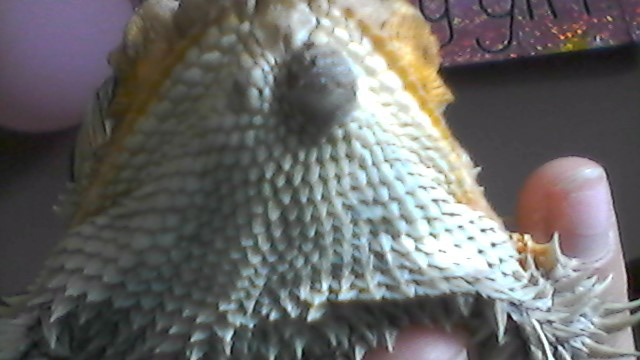 Bearded Dragon Wart/Mole/Skin Tag
Question
Wart Wart2
Hi Mick. Thank you for
Bearded Dragon Wart/Mole/Skin Tag
Question
Wart Wart2
Hi Mick. Thank you for
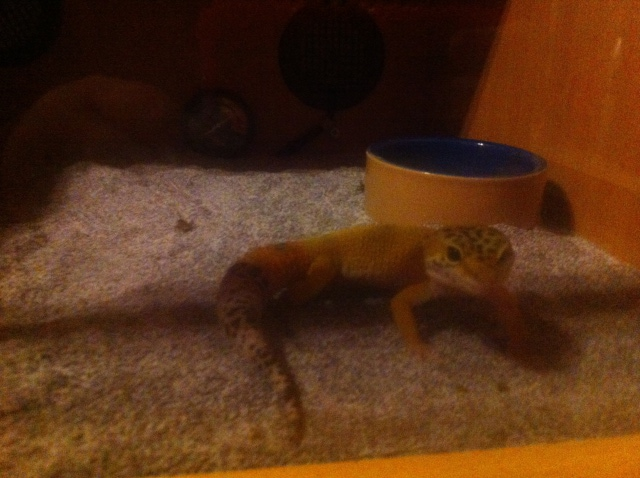 Eating habits in my leopard gecko
Question
Taken a few moths ago
Ive had my gecko
Eating habits in my leopard gecko
Question
Taken a few moths ago
Ive had my gecko
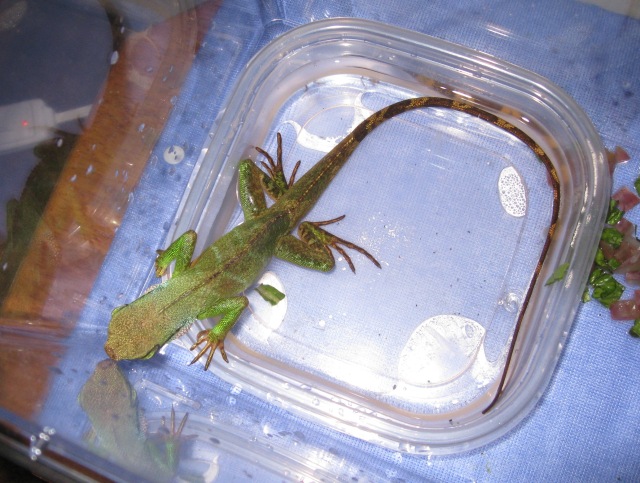 Help-Found American Water Dragon
QuestionQUESTION: My son found what appears to be an Am
Help-Found American Water Dragon
QuestionQUESTION: My son found what appears to be an Am
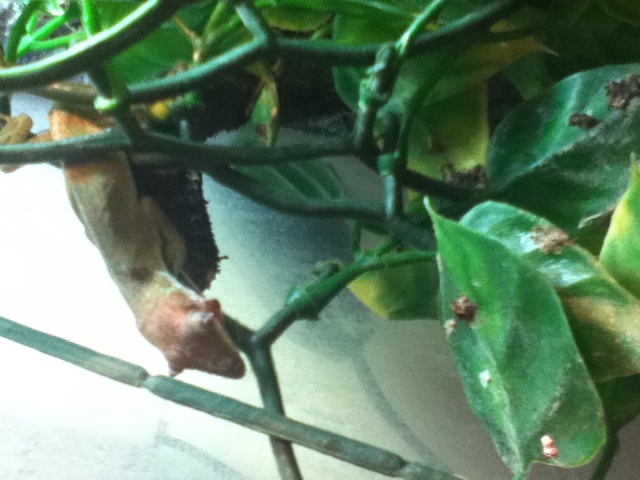 Sick Green Anoles
QuestionQUESTION: Hi, I have 2 Green Anoles who are rea
Sick Green Anoles
QuestionQUESTION: Hi, I have 2 Green Anoles who are rea
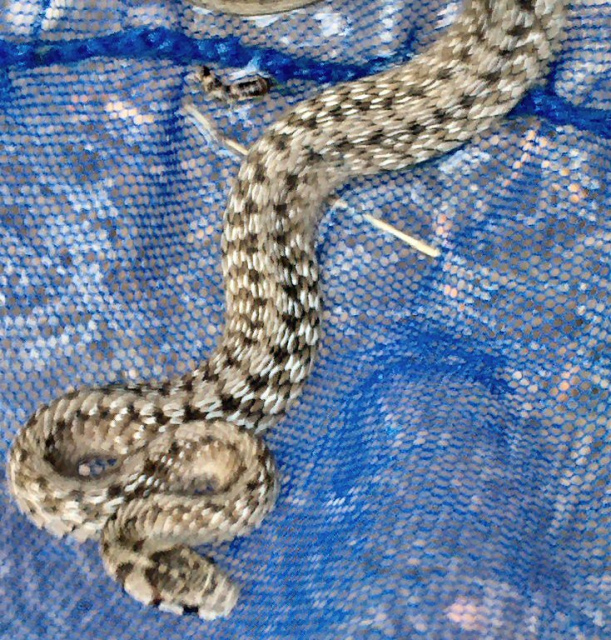 Snake ID please?
Question
Snake!
Hi Donna,
This snake was found in a po
Snake ID please?
Question
Snake!
Hi Donna,
This snake was found in a po